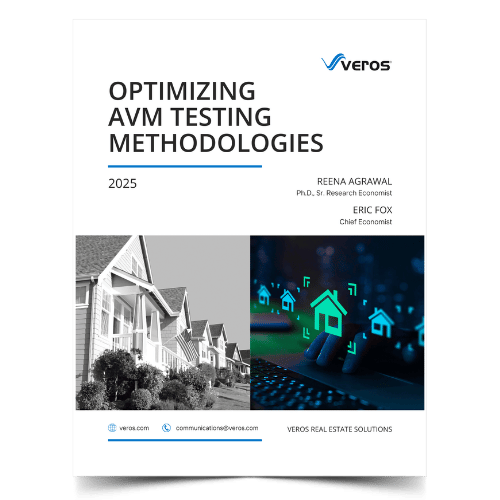In another meaningful stride towards fairness and transparency in the housing market, the U.S. Department of Housing and Urban Development (HUD) announced (HUD No. 24-096) a reconsideration of value (ROV) policy change through the Federal Housing Administration (FHA) on May 1, 2024. In addition, the government-sponsored enterprises (GSEs) followed suit. Fannie Mae® announced a Selling Guide ROV update (SEL-2024-03, B4-1.3-12), as did Freddie Mac® (Bulletin 2024-6), on the same day as the new HUD ROV policy.
The HUD policy, effective September 2, 2024, allows borrowers participating in the FHA Single Family program to request a reassessment of their property’s appraised value if they suspect inaccuracies or biases. The Fannie Mae Selling Guide ROV update and Freddie Mac Guide Bulletin, effective August 29, 2024, outlines a specific framework for lenders to review and respond to a borrower-initiated request for ROVs. At Veros Real Estate Solutions (Veros) and Valligent (a Veros Software Company), we commend this progressive initiative and stand in full support of its objectives.
Empowering Borrowers:
The essence of the new FHA ROV policy and GSEs Selling Guide ROV updates lies in empowering borrowers. It acknowledges the possibility of appraisal inaccuracies and ensures borrowers have a recourse mechanism. Now, borrowers can request an ROV backed by clear guidelines and disclosures provided by lenders at the time of mortgage application and appraisal presentation. However, only one borrower initiated ROV is allowed per appraisal, and a ROV is no longer allowed after the loan is closed. Borrowers must be educated about their right to appeal an appraisal, and how to go about doing so.
Lender Responsibilities:
Under the new ROV guidelines, lenders have new requirements. The lender must inform the borrower of their right to request and ROV in the initial disclosure documents, and upon delivery of the appraisal report to the borrower. The lender must train underwriters to identify and rectify appraisal deficiencies, including racial and ethnic bias. All lenders must complete an appraisal review before starting the ROV process. The ROV processes cannot conflict with Appraiser Independence Requirements. Furthermore, lenders are mandated to handle ROV requests promptly and transparently, maintaining rigorous quality control standards throughout the process.
Standards for Appraisers:
Appraisers also play a pivotal role in this ecosystem. The policies set standards for appraisers to respond to lender requests for ROV reviews per the defined turn-time expectations of the lender, ensuring accountability and professionalism in their assessments. The revised appraisal report should include specific commentary explaining the appraiser’s conclusions, whether the appraiser determines that changes are needed in the ROV or not.
Our Commitment at Veros and Valligent:
At Veros and Valligent, we wholeheartedly support initiatives that safeguard borrowers against racial or ethnic bias in home appraisals. In line with this commitment, we have actively and continue to implement measures to reduce bias and enhance transparency in property valuations.
- iVALUATION Pilot:
Veros’ recently launched a pilot program for iVALUATION™, a technology platform that harnesses automated valuation models (AVMs) and nationwide sales data to empower mortgage originators, home equity lenders, and asset managers to validate property values efficiently. This tool facilitates the ROV claims process, enabling stakeholders to verify appraised values with ease and accuracy. Once the iVALUATION pilot is complete, it will be widely offered to the market. Interested parties may inquire about being a part of the pilot program.iVALUATION was developed in conjunction with the U.S. Department of Veteran’s Affairs (VA) as part of our Appraisal Management System partnership. It is currently being implemented at the VA as part of their ROV process. Furthermore, the potential of iVALUATION extends beyond the VA, as other government entities express interest in adopting this technology in the future.
AVMs Tested for Bias:
Over the past two years, Veros Economists have researched and tested VeroVALUE™ AVMs to see if they contained any bias or were impacted by Historical Redlining. After rigorous analysis in three separate studies, the research has proven that AVMs can be an invaluable tool for delivering accurate and fair valuations.- BiasCHECK Appraisal Review:
All Valligent traditional appraisals undergo a robust quality control process with BiasCHECK™, a Veros technology-based risk analysis solution to quickly detect if an appraisal may be at risk for potential bias or quality issues that need deeper analysis. BiasCHECK utilizes a highly confident VeroVALUE AVM, appraisal quality scoring, and content-enabled word scans provided by Veros. This proactive appraisal review helps ensure fair and accurate home appraisals. - Diversified Appraisal Training:
Our Valligent appraisal training program aims to diversify the industry’s pool of appraisers. By providing comprehensive training and support, we strive to foster long-term inclusivity and equity in property valuations.
FHA’s and the GSE’s new ROV guidelines mark a pivotal moment in the quest for fairness and transparency in home appraisals. At Veros and Valligent, we celebrate this initiative and remain dedicated to our mission of eliminating biases and ensuring equitable property valuations for all. Together, with concerted efforts from stakeholders across the industry, we can build a housing market that is truly inclusive and just.
If you’d like to learn more, please contact a Veros or Valligent representative at 866-458-3767 Option 2, or email communications@veros.com.
For more information about HUD and its programs visit www.hud.gov. To learn more about HUD’s property appraisal and valuation equity work click here.
For more information about Fannie Mae and the Selling Guide updates, visit Single-Family Homepage | Fannie Mae.
For more information about Freddie Mac and the Guide Bulletin, visit https://guide.freddiemac.com/app/guide/home








